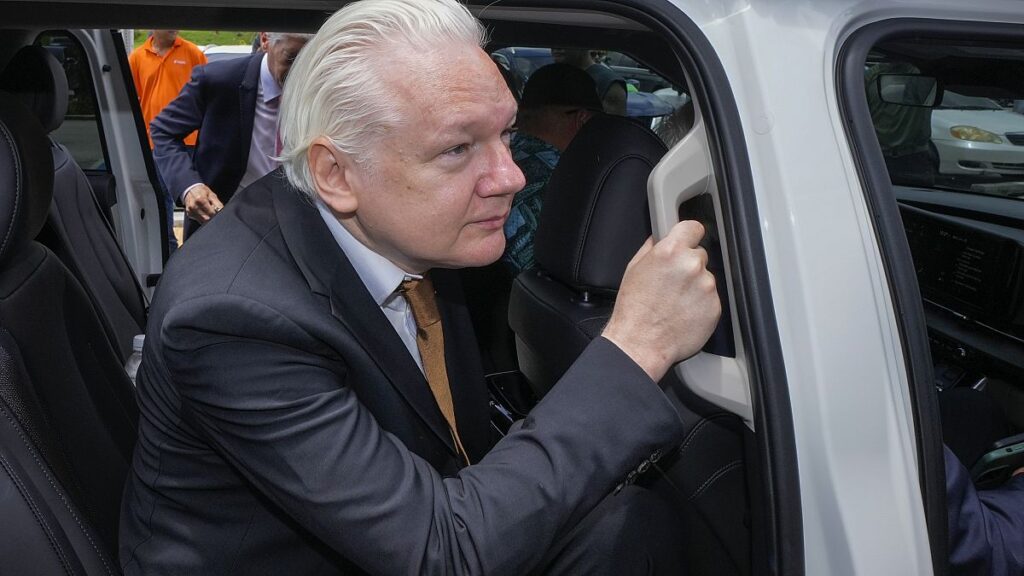After pleading guilty to publishing WikiLeaks on US military secrets, Julian Assange was released. He immediately left the Northern Mariana Islands to return to Australia.
At the end of a short audience, he gave a small smile. Of relief, no doubt. And bitterness too. After fourteen years of epic legal battles and five years of incarceration in a high security prison in the United Kingdom, Julian Assange, 52, regained his freedom this Wednesday.
His release was the result ofan agreement reached with American justice: Wikileaks founder had to plead guilty to obtaining and publishing US military secrets. The end ofa long legal saga that has raised controversial questions about press freedom and American security policy.
And it was ultimately in Saipan, the capital of the small Mariana Islands in the Pacific – a territory associated with the United States – that the journalist’s fate was finally sealed.
If the agreement forced the Wikileaks publisher to admit his guilt (on a single charge), it also allowed him to return to Australia without going to an American prison.
The Saipan judge, who released him, previously sentenced to 5 years in prisona sentence covering the years spent behind bars in the United Kingdom without counting the seven years spent in the Ecuadorian embassy in London where he found refuge without ever having been convicted.
The United States demanded his extradition for espionage in particular. He faced a serious sentence of life in prison. THE
The conclusion of this matter allows both parties to express a certain satisfaction. Julian Assange, for his part, was reluctantly satisfied with the resolution, telling the court that while he believed the Espionage Act contradicted the First Amendment, he accepted the consequences of soliciting information. classified from sources for publication.
Jennifer Robinson, one of Assange’s lawyers, told reporters after the hearing that the case “creates a dangerous precedent that should worry journalists around the world.”
“It is a huge relief for Julian Assange, for his family, for his friends, for his supporters and for us – for everyone who believes in freedom of expression around the world – that he can now return home in Australia and reunite with family”said the lawyer.
For the American accusers, Julian Assange’s conduct had endangered lives and exceeded the limits of traditional journalistic functions.
The criminal case brought by the Trump administration’s Justice Department focused on the receipt and publication hundreds of thousands of war documents and diplomatic cables containing details of US military wrongdoing in Iraq and Afghanistan.
Prosecutors alleged he teamed up with former military intelligence analyst Chelsea Manning to obtain the files, including conspiring to crack a Department of Defense computer passwordand that he had published them without regard to American national security.
The names of human sources who provided information to U.S. forces in Iraq and Afghanistan were among the details revealed, prosecutors said. But these leaks had sparked a wave of support from press freedom defenderswho praised its role in highlighting military behavior that might otherwise have remained hidden and warned of a chilling effect on journalists.
Among the files released by WikiLeaks was video of a 2007 Apache helicopter attack by US forces in Baghdad who killed 11 people, including two journalists from Reuters. The indictment was unsealed in 2019, but Julian Assange’s legal troubles long preceded the criminal case and continued well beyond. Weeks after the release of the largest cache of documents in 2010, a Swedish prosecutor issued an arrest warrant for Assange based on woman’s rape allegations and allegations of assault of another. The journalist long proclaimed his innocence and the investigation was then abandoned.
He showed up in 2012 at the Ecuadorian embassy in London, where he sought asylum from political persecution, and spent the next seven years in exile there, hosting a parade of famous visitors and making periodic appearances from the building’s balcony to address supporters.
In 2019, his Ecuadorian hosts finally withdrew his asylum, allowing British police to arrest him. He was then imprisoned while the US Department of Justice sought to extradite him, in a process that ran into opposition to skepticism of British judgesworried about how Julian Assange would be treated by the United States.
Ill, and very psychologically affected by this affair, according to his lawyers, Julian Assange returned to his native land on Wednesday.

